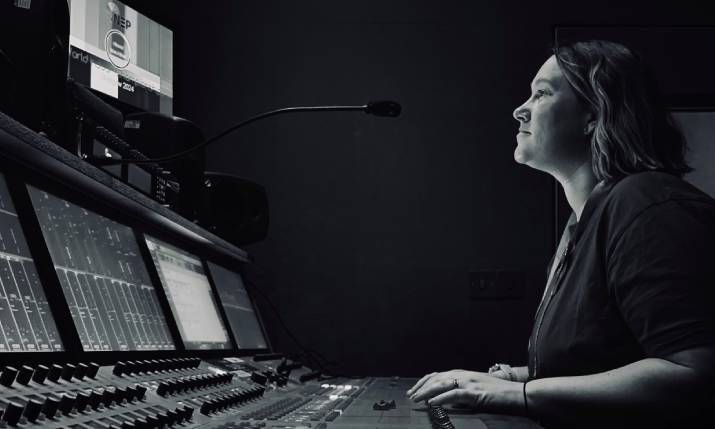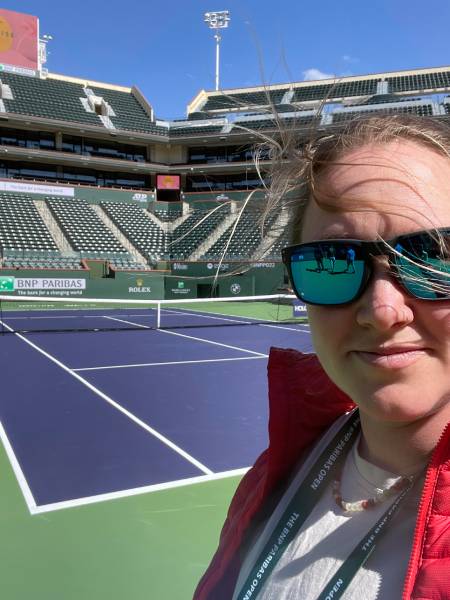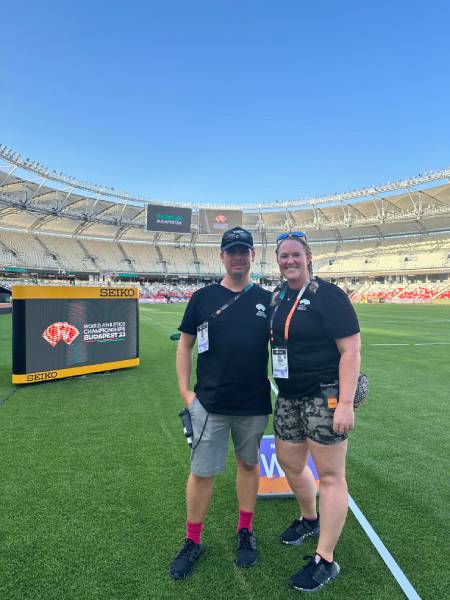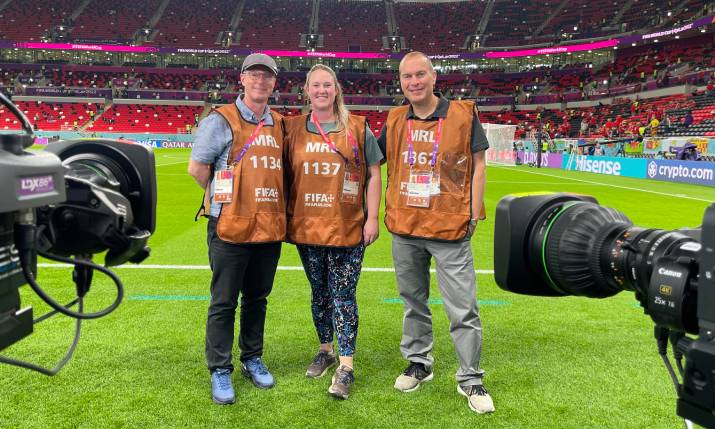Making music: Moving from the Royal Marines to a career in sports broadcasting audio with Sophie Lambert

Sophie Lambert working at the World Athletics Indoor Championships in Glasgow, Scotland, as sound supervisor for the shotput feed in early March 2024
Sophie Lambert is a former Royal Marine musician turned sports broadcasting sound engineer. She runs a business with her husband – the pair are both freelance sound engineers – and they often get to work together on the same jobs.
How did you first find out about TV broadcasting as a career?
When I left the military I ended up working at Arqiva as a major events bookings coordinator, planning and booking satellite and fibre distribution for major sporting events around the world. Arqiva have lots of ex-military employees and I met some of them down the pub in Winchester and they invited me to apply for the role. At that point I didn’t really know all the building blocks that go into making the shows themselves, but I loved seeing the events I had planned appear on TV.

Sophie Lambert on court in California at the BNP Paribas Open 2022
What was your inspiration or idea, and why sports broadcasting?
I was eventually made redundant from Arqiva and I set my sights on making the TV instead of distributing it. I had some contacts in the industry, and as a musician the sound department seemed like the best fit.
As a 30 year old I went and did as much work experience and shadow days as I could on light entertainment shows and sport. Eventually I was offered a job with Telegenic as a trainee sound assistant.
Sport broadcasting is exciting; it’s live which means you simply can’t cock it up – working under pressure, and having the problem solving skills are super important – things which I had learned in the military. I just needed to apply the technical broadcast audio-specific ones.
Tell us more about your time at Telegenic.
As a trainee sound assistant at Telegenic my time was split between the warehouse learning all about the kit and loading the tenders, then out on site looking after their many and varied sports and entertainment contracts. I shadowed more experienced engineers for a while and gradually was given responsibilities for different areas.
A lot of being a sound assistant out on the floor or pitch is you need really good people skills, managing talent and guests, as well as the engineering. I knew I had the people skills; I was a bit older had done a lot of life compared to the 20 year olds in the department. I just needed to experience things going wrong, how to solve them, and how to most efficiently set different bits of kit up. I loved the learning, being at the big sports events and working with all the different people.
I left Telegenic in 2021 having gained a wealth of knowledge across all sorts of different events and contracts and I have been freelance ever since. This year I am moving into the role of sound supervisor and really enjoying the new challenges that brings with it. I spend a lot of my year working on the ATP tennis tours, sometimes on site and sometimes mixing remotely back in London.
What did you study before your career?
I studied art, music and drama at college, and went onto the Liverpool Institute for Performing Arts (LIPA) where I did the music theatre and entertainment management course. However, I left after a year and joined the Royal Marines band service as a percussionist. I served for six years and eventually ended up at Arqiva once I left.
How is freelance life going?
I have gained a large network of colleagues from all over the industry and they contact me to directly work for them on various events. Some are regular – yearly – and some like the funeral of the Queen or the Coronation of King Charles are one-offs and usually the sound supervisor gets in touch for things like that.
The OB industry is held together with a huge network of freelancers in all departments. This has its benefits as I can look for events I’d really like to work on, but has its flaws as work isn’t guaranteed.
Being freelance is both exciting and stressful. Learning to say no is very difficult as sometimes you don’t know when your next job will come in. I’m lucky to have some work for production managers who see the value in a regular crew returning to the same event each year. But it’s a balance to keep a mix of work for different companies as no work is ever guaranteed. I love the travelling that comes with this life especially on the tennis tour, but it does mean I don’t get to go home very often. I’m lucky to work often with my husband so at least I see him, but I can go months sometimes without going back to my home.

Sophie Lambert looking after the field of play for the World Athletics in Budapest 2023, alongside her husband Chris
What’s the most challenging thing about working in live sport today, or generally, and why? Over the last couple of years I’ve worked predominantly in tennis and athletics. Both of these events are very long days, so having the stamina and endurance to make them a success is a challenge, often with jet lag, far away from home.
I try to take a large chunk of time off between December and February to hibernate at home in order to recover from a year of travel; for my mental and physical health this is really essential (but obviously comes with financial implications).
What challenges have you faced over the course of your career, and how did you get you get past those challenges?
When I served in the Marines I was the only women to do my specific job in percussion in the whole band service at the time, so coming into sound in broadcasting wasn’t much of a shock.
I’m used to being the only woman on the sound team – although it’s so, so lovely when I’m not! I think that as a women, I’m less inclined to say yes to a challenging role unless I’m 99% sure I can nail it, but I’m certain the lads don’t think like that at all. I’ve learned to push myself out my comfort zone and believe in my own abilities more.
What do you think has been a particularly exciting or cutting edge thing in sports broadcasting?
Remote production has obviously totally changed the way we make sport. I sit in London with a mixing desk where I can pick up feeds from all over the world, with the commentators in the next room to me. This is always evolving and getting better; nothing beats the atmosphere and feeling of being at the event itself though!
What’s the coolest thing you’ve worked on in the course of your career?
The Funeral of Queen Elizabeth; for this I was working for the BBC looking after the presentation studio. I had originally been in London to work at the Last Night of the Proms, when she passed and it was a scramble to get the plan in motion for the funeral.
We derigged the hall for Last Night of the Proms and met the truck at the other side of Hyde Park where we set up the BBC studio [for the funeral].
We had a huge number of very high profile guests whom I had to prepare for their time on set by micing them up ensuring we would get the best audio from them; in these moments you don’t have very long, people are often wearing beautiful outfits you don’t want to damage or mark, and they are often busy talking to the other guests, so people management is so, so important.
It was an amazing thing to be a part of and the sound team won a BAFTA for it, which was a nice cherry on top.
Sporting-wise a highlight for me was running the line at Twickenham during a Six Nations match; I was on one side following the action with a mic and my husband was on the other!

Pitchside at the UEFA World Cup in Qatar 2022 where Sophie Lambert was mixing a highlights show for BBC Sport
What advice would you give to other women looking to move into a role in sports broadcasting like your own?
Find someone working in the bit of the industry you’re interested in; if you’re not sure what that is then just find anyone they can tell you how it all works.
To work in OB’s you mainly need the enthusiasm and drive to succeed, not a degree or qualification (I don’t have any at all…). Talk to people, seek them out. If you have the right attitude the OB world will welcome you and you’ll find a place where you fit in.
Be prepared for long days – in the rain – to learn your craft. It’s not for everyone, but we are a big TV family who travel the world and there’s always room for one more!

